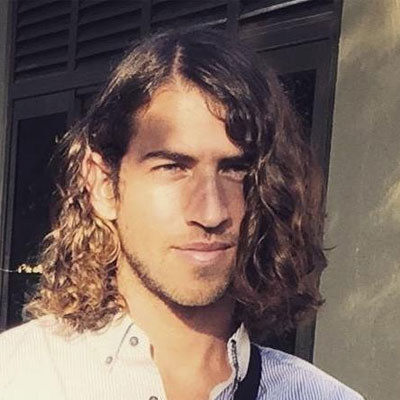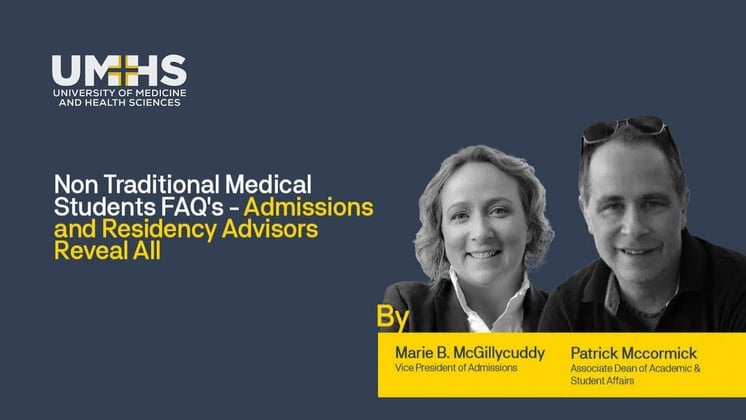Pursuing a medical degree can be a daunting task, especially if you don’t fit the stereotypical mold of a pre-med student. Whether it’s because of lower grades or test scores, an unaligned educational background, or even an accelerated age, you may feel there are very few opportunities to achieve your dreams as a non-traditional medical student.
It’s important, however, for prospective students to understand what a non-traditional student is and why it shouldn’t hold you back in your career pursuits. But what is a non-traditional student? Can you still go to medical school if you’re considered “non-traditional”? Can you get a residency? Can you be successful? In short, you absolutely can!
What Is a Traditional Medical Student?
Think of a pre-med student. You might be envisioning a straight A’s student in their early twenties with a degree in biology or chemistry. While in school they’re involved in research work and bulk up their resume and application with volunteer community service. They’ve established their pre-med track with a college advisor who recommends next steps and institutions that best fit their interests. They apply, get in, and move on to a successful career relatively early in life.
According to Marie McGillycuddy, Vice President of Admissions at UMHS, “this is what the world tags as ‘traditional.’”
What Is a Non-Traditional Medical Student?
Everyone else, outside of this framework, is considered “non-traditional.” Looking at the requirements of traditional students it comes as no surprise that a large majority of individuals wanting to pursue a career in medicine are considered non-traditional.
This can be comforting if you’re unsure of your chances to succeed in the highly competitive field of medicine. Just because you’re classified as non-traditional doesn’t mean you can’t succeed. In fact, McGillycuddy goes as far as saying “‘non-traditional’ is now the ‘traditional.’”
Medical School ROI Calculator
Calculate your expected lifetime earnings and determine the ROI of medical school.
The Key Differences
Even though traditional and non-traditional students pursuing a medical career can achieve the same success, there are some stark differences between the two. It’s important to be aware of these differences so you can better understand how to leverage your “unconventional path” when applying for residencies and jobs.
1. Background
One of the biggest differences between traditional and non-traditional medical students is their background. Non-traditional applicants often come from more diverse backgrounds that may have contributed to the need for an alternative path.
For example, prospective students who speak a foriegn language and learn English much later in life aren’t usually able to attend medical school at the “traditional,” young age. These students need a few additional years to properly acclimate before entering the rigorous environment of medical school.
Some students who have an easier time breaking through the barriers that exist around medical school—because of family legacy or academic success—might struggle when it comes to finding a residency though. Patrick McCormick, Associate Dean of Academic and Student Affairs, explains that “your story automatically is more unique than a traditional story . . . The perspective at the residency level is different from the perspective of the admissions level when it comes to who is traditionally afforded a privilege to travel this path . . . They're looking for your story.” In the end, these life experiences set you apart from other applicants and could lead to more success outside of medical school.
2. Experience
Unlike the traditional path to medical school, many prospective medical students don’t apply right after their undergraduate degree. In fact, some don’t even work in the medical field, pursuing careers like finance, accounting, and more. At first glance this might seem like a major disadvantage when pursuing a medical career, but McCormick says otherwise. “Those types of candidates have many more attributes that they can present to the next level. Then it can actually set them apart and strengthen their application rather than with traditional students.”
Not only that, career changers are often viewed as courageous and admirable. McCormick goes further on to say, “if you have the courage at 28, 30, whatever, to then change course and go all the way back and say, ‘this is what I've done, and this is what I want to do.’ Isn’t that a more impressive, courageous decision than to stick with whatever you got?”
3. Age
Many non-traditional students are considered “older” compared to traditional students. Most fall in the 30s to 40s age range, but there are instances where students even older than that try to pursue their dreams of practicing medicine.
To many older students thinking about applying to medical school, the age difference is intimidating. You might feel that it’s either too late, or you have fallen too far behind. The admissions staff at UMHS could not disagree more. “People who seek medicine, having recognized what they were doing isn’t what they want now. Wouldn't you trust people with that motivation over a 21 year old, who's always been destined to go into medicine because of family or expectations?”
Instead of seeing old age as a setback, it’s important to see the major advantages you have over younger, less experienced applicants—especially in the interview process for residencies. “Who do you think has an advantage in that situation? A 22 year old who's never been interview[ed] or a 30 year old who . . . understands how to be a professional?” McCormick urges students of accelerated ages to remember that if you’re invited to interview for a residency, that hospital or facility has already said “yes” to your experience—including your age.
It’s All About Authenticity
In any competitive field it’s important to make yourself stand out from other applicants. To UMHS, it comes down to one question: What's your story? Whether you’re 30 years old, started another career outside of the medical field, or have a background outside of the stereotypical doctor, think about how you can use your experiences to your advantage!
The admissions office at UMHS brings 46 years of combined experience working with “non-traditional” students and navigating them through the application process, academics, and matching process for residency positions. Interested in learning more? Check out the Carribean Medical School Guide for more information about this alternative path to your dreams.
You can also watch UMHS’s live stream discussion on “Non-Traditional Students” to get a better sense of how non-traditional applicants can have an advantage in today’s changing healthcare landscape.
With the right tools, you can be successful. As McCormick explains, “we've had so many stories where students have been able to convert this moment into success through one thing: authenticity.”
About UMHS:
Built in the tradition of the best U.S. universities, the University of Medicine and Health Sciences focuses on individual student attention, maintaining small class sizes and recruiting high-quality faculty. We call this unique approach, “personalized medical education,” and it’s what has led to our unprecedented 96% student retention rate, and outstanding residency placements across the USA and Canada.

Ryan is the Director of Marketing at UMHS. He holds a Masters in Public Health from the University of Southern California and a BA in Marketing from the University of Maryland, College Park. He is also a musician an avid outdoorsman.


















